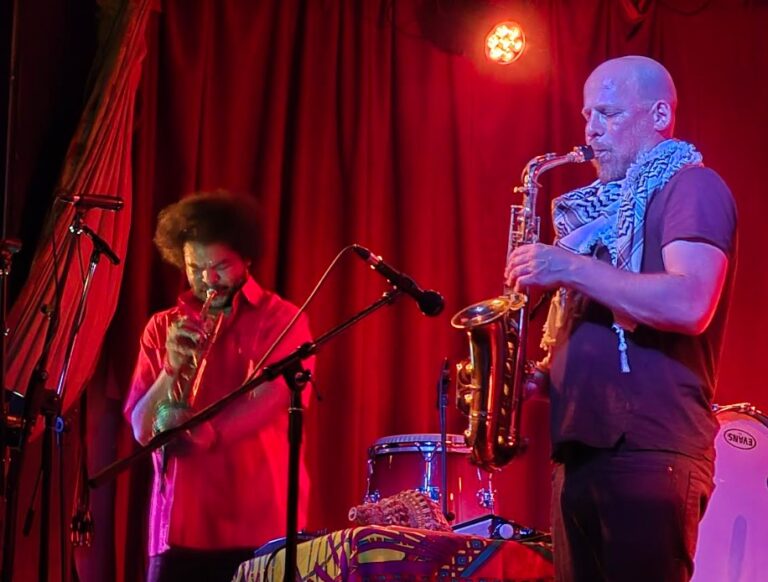An international festival can now have several dimensions, as cultural networks have multiplied exponentially in recent decades. The Suoni Per Il Popolo are part and parcel of this reality, and we could observe it this week at the Sala Rossa and Casa del Popolo, notably with this meeting between musicians from Philadelphia and Montreal, brought together on the same stage.
Monday evening began with some bad news: Moor Mother, the best-known artist in the Philly areopagus, had taken a flight that ended badly, as her plane had to turn back because of a passenger in crisis. Moor Mother was supposed to reschedule on Tuesday, but ended up canceling her engagement. It was therefore an opportunity to discover her African-American colleagues, united under the banner of the Irreversible Entanglements collective.
Luke Stewart (double bass), Tcheser Holmes (drums), Aquiles Navarro (trumpet, electronics), Keir Neuringuer (alto + soprano saxophones, electronics), joined by Montrealers Geneviève Gauthier (alto sax), Nicola Caloia (double bass), skin tone (mbira, electronics, sax), Jason ” Blackbird ” Selman (poetry and trumpet) and Kim Zombik (vocals).
The evening was built on a series of typically free jazz interventions of variable geometry. Solo sax by Aquiles Navarro, followed by double bass-voice-poetry (Caloia, Zombik, Selman), interspersed with mbira (a metal-striped instrument that some call the African piano), after which the MTL and Philly artists gradually mingled until the Irreversible Entanglements quartet brought the evening to a close, as they did the following day, Tuesday.
For those who see free-jazz as a redundant form implying limited technique on the part of its performers, it’s worth noting that high virtuosity is also part of the equation, as many excellent, more conservative jazz musicians also engage in free improvisation. The excellent saxophonist Geneviève Gauthier, for example, shines in many different contexts, including free and (especially) atonal improvisation
The Philadelphia quartet, for their part, don’t stick to conventional forms of free jazz, grafting on polyrhythmic grooves, typical of contemporary jazz or downright jazz-fusion, which differs considerably from the ” deconstructed swing ” approach of previous generations. The influx of electronic music via keyboards, computers and other cutting-edge technologies lends new colors to free improvisation. Certainly, the new generation of improvising musicians approaches free-jazz by enriching its discourse with components typical of the lutherie of 2024.
Another observation made the following Tuesday at the Sala Rossa, following the screening of a groove concert led by saxophonist Eric Hove and filmed in Parc Jean-Drapeau’s Biosphère, was that melody and tonality/modality are not excluded from the so-called free discourse, We observed and savored this during the duo formed by inspired singer Kim Zombic and double bassist Nicola Caloia, the best of the genre in Montreal since the (increasingly distant) days of the Michel Donato/Karen Young tandem.
This hybrid approach was again in evidence on Thursday evening at Casa Del Popolo, as Montrealer Charlotte Layec’s bass clarinet juxtaposed her real-time playing with a series of filtered and recomposed recordings of mostly folk music. The same was true of the duo featuring Chicago saxophonist (alto and soprano) Dave Rempis and guitarist Tashi Dorji, originally from Bhutan and now based in Asheville, North Carolina. While the saxophonist’s playing, although very good, didn’t teach us much about free vocabulary as we imagine it, Dorji’s playing proved to be very singular for its explorations of saturation, its percussive approach and other textural research via a vast assortment of effects pedals.
It is to be hoped that this hybrid approach will find less confidential audiences and galvanize jazz lovers on a wider scale.
























